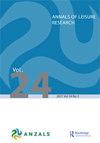Introduction to special issue on being outdoors: challenging and celebrating diverse outdoor leisure embodiments and experiences
IF 2
Q2 HOSPITALITY, LEISURE, SPORT & TOURISM
引用次数: 2
Abstract
The inception to this special issue started long before the three guest editors ever met and certainly long before the call for papers was made. Mandi, as the instigator of the special issue, traces it to musings during the days writing her PhD. She could see that dominant discourses about how to ‘be’ in the outdoors were fairly limited and limiting. Outdoor recreation and education scholars were seeing this and calling for change (Allison and Pomeroy 2000; Gray 2018; Humberstone and Pedersen 2001; Warren et al. 2014). While these academic provocations were raising questions in her, it was something her aunt, a Native Canadian of the Nlaka’pumax nation, said that helped her think in new ways and question views that she had often assumed were universal. Her aunt’s conceptualization of land and possession was so different to the one Mandi had in her head, at the time. Mandi’s aunt understood people as belonging to the land. Thus, she identified Mandi as belonging to the Six Nations due to her birth and childhood being in that place. When Mandi protested that she did not belong to the Six Nations, her Aunt pointed out that it was the land she was born on so it was the land she belonged to. Rather than the land being a possession of Mandi’s, she was a (beloved) possession of that land. They were and are ‘her’ trees and rocks. Not to own but the ones that brought her comfort and familiarity and which, each time that she returns, give her a sense of home, peace and rejuvenation. Much like the relationship of a child to a parent or grandparent, Mandi was blissfully unaware of what her land provided her with at first but as she matured in her relationship with it, she recognized the need to exert care for it and the legacy it creates for the generations to come (Straker 2020). The land she belongs to deserves and requires her stewardship. This is a way of thinking that is deeply engrained in indigenous discourses around being, land and leisure (Henhawk 2018; Mowatt 2018; Wheaton et al. 2020). It has marked a profound and transformational shift away from discourses of outdoor recreation focused on mastery, quest, conquering and possession that are often propelled by popular and academic publications that see outdoor experiences as something solely for the outcome or accomplishment, a western and hegemonic masculine dominated construct (Zink and Kane 2015). Within this context, being committed to the ethics and theory of poststructuralism does not in itself make you see, hear or reflect on blind spots or discourses that are户外特刊简介:挑战和庆祝多样化的户外休闲体现和体验
这期特刊的创刊早在三位客座编辑见面之前,当然也早在征稿之前。曼迪作为这期特刊的发起者,将其追溯到她写博士时的沉思。她可以看到,关于如何在户外“存在”的主流话语是相当有限和有限的。户外娱乐和教育学者看到了这一点,并呼吁改变(Allison和Pomeroy,2000年;Gray,2018年;Humberstone和Pedersen,2001年;Warren等人,2014)。虽然这些学术挑衅在她身上引发了问题,但正是她的姑姑,一位Nlaka'pumax民族的加拿大原住民说的话,帮助她以新的方式思考,并质疑她经常认为普遍存在的观点。她姑姑对土地和财产的概念与当时曼迪脑海中的概念截然不同。曼迪的姑姑认为人是属于这片土地的。因此,她认定曼迪属于六国,因为她的出生和童年都在那里。当曼迪抗议她不属于六国时,她的姑姑指出,这是她出生的土地,所以这是她属于的土地。与其说这片土地是曼迪的财产,不如说她是这片土地的(心爱的)财产。它们过去和现在都是“她的”树木和岩石。不是为了拥有,而是那些给她带来舒适和熟悉的东西,每次她回来,都会给她一种家的感觉、平静和复兴。就像孩子与父母或祖父母的关系一样,Mandi起初幸福地不知道自己的土地为她提供了什么,但随着她与土地关系的成熟,她认识到有必要对土地及其为子孙后代创造的遗产给予照顾(Straker 2020)。她所属的土地是应得的,需要她的管理。这是一种深深植根于土著人关于存在、土地和休闲的话语中的思维方式(Henhawk 2018;Mowatt 2018;Wheaton等人2020)。它标志着一种深刻而变革性的转变,从专注于掌握、追求、征服和占有的户外娱乐话语转向了通常由流行和学术出版物推动的户外娱乐,这些出版物将户外体验视为仅仅是为了结果或成就,一种西方和霸权男性主导的结构(Zink和Kane,2015)。在这种背景下,致力于后结构主义的伦理和理论本身并不会让你看到、听到或反思盲点或话语
本文章由计算机程序翻译,如有差异,请以英文原文为准。
求助全文
约1分钟内获得全文
求助全文
来源期刊

Annals of Leisure Research
HOSPITALITY, LEISURE, SPORT & TOURISM-
CiteScore
5.30
自引率
10.50%
发文量
30
 求助内容:
求助内容: 应助结果提醒方式:
应助结果提醒方式:


